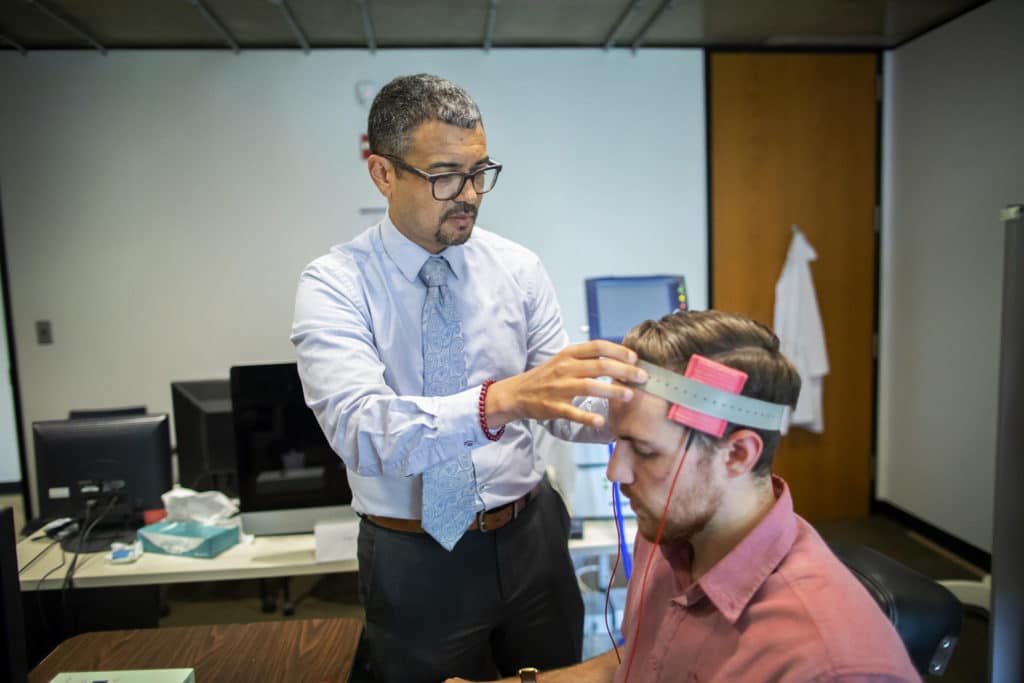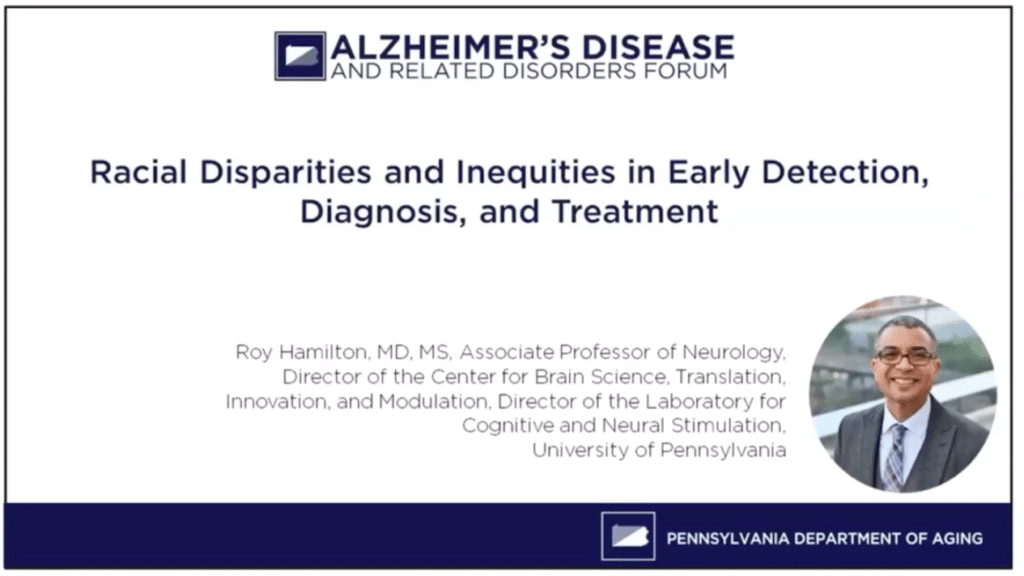By Abigail Ahearn
Around the time Roy Hamilton, MD, MS, was completing his neurology training, his father began developing memory-related issues. Dr. Hamilton noticed that his father was repeating himself in a conversation, forgetting important names, and having trouble with financial management and route finding.
At the 2020 Alzheimer’s Disease and Related Disorders (ADRD) Forum on Nov. 5, Dr. Hamilton spoke about his personal experience with the disease.
“Even though at the time I was training to become a neurologist, there were a lot of thoughts that went through our minds and different ways of framing what was happening to my father, that sort of got in the way of a clear-eyed view of what was actually happening,” he said. “A lot of thoughts went through our minds that may have gotten in the way of him getting the kind of care that he needed initially, even though he was the father of a neurologist and someone who is going to become a cognitive behavioral neurologist who sees patients with Alzheimer’s disease.”
Dr. Hamilton is currently a physician researcher at the Penn Memory Center and served as the keynote speaker at the ADRD forum hosted by the Pennsylvania Department of Aging.

Attended virtually by both top researchers, clinicians, and stakeholders alike, the forum discussed racial disparities and inequities in early detection, diagnosis, and treatment, and emphasized the need for increased partnerships and support between medical establishments and communities of color, increased diversity amongst clinicians and investigators, and the need for increased awareness regarding the disproportionate impact of Alzheimer’s disease and related disorders on Latinx, African American, and Native American communities.
Messages from Pennsylvania Governor Tom Wolf and Secretary of Aging Robert Torres were featured, in addition to a panel discussion between caregivers for those living with Alzheimer’s disease and other dementias, as well as an update from the Pennsylvania ADRD Task Force.
Dr. Hamilton began by giving a review of Alzheimer’s disease and its related disorders, including the difference between them, before moving on to addressing the disproportionate burden of Alzheimer’s disease in minorities, disparities of dementia care for people of color, and the steps that can be taken to address disparities and equity in AD.

When looking at statistics, rates of Alzheimer’s disease are more prevalent in minorities than amongst white populations. This is contributed to by a higher set of risk factors in people of color, including social determinants of health, bias and discrimination in medicine and disparities in research, cultural beliefs, and the impact of other diseases, such as hypertension or cardiovascular diseases, which can increase the risk of AD. This is also bolstered by cultural differences regarding the stigmas surrounding aging and mental decline in communities of color, which leads to seeking out care at a later stage of AD than white communities.
Additionally, due to a lack of access to education on neurodegenerative diseases, lack of access to care, and healthcare discrimination leading to higher care costs, minorities in the United States receive inferior care for these disorders when compared to white populations.
The combination of health care systems not designed to equally support people of color with that of white counterparts, along with medical discrimination, biases, stereotyping, and uncertainty, allow for a large disparity amongst the quality of care given to minority groups.
“It is critical that we partner with communities of color comprehensively to enhance awareness of Alzheimer’s disease and promote diversity in research participants,” Dr. Hamilton said, emphasizing the need to build up trust between the medical community and communities of color after long histories of medical racism, human rights violations, and unethical and illegal practices.
The lack of focus toward minority groups when it comes to research can also be attributed to the lack of diversity amongst clinicians and investigators in dementia.
“The clinician workforce, with respect to Alzheimer’s disease and related disorders, is heavily under-representative of communities of color,” Dr. Hamilton said.
He emphasized the importance of increased diversity in the clinician workforce in order to increase focus, consideration, and effort toward community outreach and direct work with patients.
As an example of successful endeavors into bolstering diversity amongst clinicians and researchers, Dr. Hamilton highlighted Penn’s own pipeline programs dedicated to increasing the number of scholars committed to the research and treatment of Alzheimer’s disease that come from diverse backgrounds and from communities of color.
In addition to increased diversity, Dr. Hamilton emphasized the need for the promotion of cultural competency and implicit bias training for clinicians and clinical researchers in order to ensure that the approach taken when treating people of color is ethically sound and done with cultural competency and sensitivity.
In his conclusion, Dr. Hamilton reemphasized the increased prevalence and more severe symptoms of Alzheimer’s disease amongst communities of color due to social determinants of health, racial bias and discrimination in medical care, and differences in comorbid diseases. To address these factors, Dr. Hamilton stressed a need for effective efforts to address these disparities in care, including authentic community partnerships, workforce diversity, and ongoing cultural and bias trainings.
Following Dr. Hamilton’s keynote address, the ADRD showcased a panel discussion regarding living with Alzheimer’s disease and related disorders, including the challenges in early detection, diagnosis and treatment. The panel discussion was moderated by Renee Chenault Fattah, Director of Pro Bono Action for Community Impact at the SeniorLAW Center, and featured talks from multiple caregivers and advocates who shared their experiences in caring for family members who lived with Alzheimer’s disease and other dementias.
The forum also highlighted updates shared by the Pennsylvania ADRD Task Force on early diagnosis and detection, as well as consumer education and community engagement. Holcomb emphasized the Task Force’s continual commitment to impact those living with a neurocognitive disorder and their caregivers, as well as a continual upholding of best practices and addressing inequities to create a positive, dementia-friendly environment across communities across Pennsylvania.
